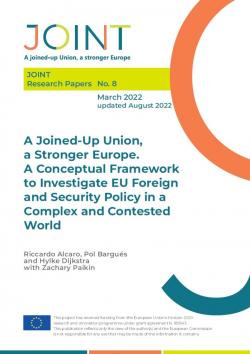A Joined-Up Union, a Stronger Europe. A Conceptual Framework to Investigate EU Foreign and Security Policy in a Complex and Contested World
Fractious domestic debates, the fragmentation of regional politics and growing interstate competition all affect the capacity of the EU to forge a joined-up and sustainable foreign and security policy (EUFSP) in crises and conflicts. The problem is amplified by EUFSP governance structures, which have evolved irregularly, with a multiplicity of actors resorting to an increasingly diverse array of policy instruments when engaging with external players on multilateral, regional and bilateral levels. The potential for improved action depends on the capacity of EU institutions and member states to work within the multi-dimensional perimeter of the EUFSP governance system to create the conditions to mitigate the effects of intra-EU contestation, regional fragmentation and multipolar competition.
-
Details
Rome, IAI, March 2022 (updated August 2022), 35 p. -
In:
-
Issue
JOINT Research Paper 8
Introduction
1. Contestation, fragmentation and competition: Key constraints on EU foreign and security policy
1.1 Internal contestation
1.2 Regional fragmentation
1.3 Multipolar competition
1.4 Interlinkages between the constraining factors
2. Multi-actor, multi-sector, multi-layered: The EU foreign and security policy system
2.1 Multiple actors
2.2 Sectorial policy tools
2.3 Multi-layered action
2.4 The structural limitations of EUFSP governance
3. Conclusions: A framework to investigate EUFSP in crises and conflicts
References



